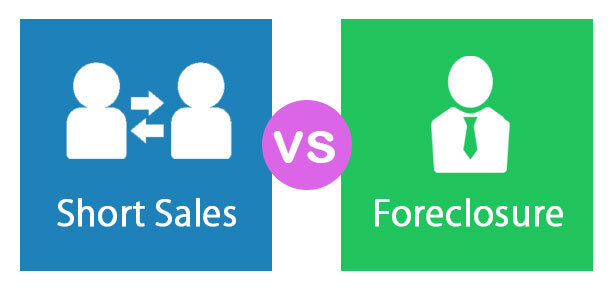Short Sale vs. Foreclosure – What’s the Difference?

When homeowners face financial hardship, the fear of losing their home can be overwhelming. For many, understanding the options available can make a significant difference in their financial future. Short sales and foreclosures are two common solutions, but they come with their own processes and implications. In this article, we will explore the key differences between short sales and foreclosures, and how they can impact your homeownership.
What Is a Short Sale?
A short sale occurs when a homeowner sells their property for less than what is owed on their mortgage. This happens when the market value of the home has dropped, and the homeowner cannot sell it for the full amount due. In this scenario, the lender agrees to accept a reduced payoff amount to settle the loan.
Pros of a Short Sale:
- Less Impact on Credit: A short sale typically has a less severe effect on credit scores compared to foreclosure.
- Possibility of a Relocation: By opting for a short sale, homeowners can move on to a new chapter without the long-term implications of foreclosure.
- Negotiate with Lenders: In many cases, homeowners can negotiate with their lender to forgive any remaining debt after the sale.
Cons of a Short Sale:
- Lender Approval Needed: The process requires the lender’s approval, which can be time-consuming and may not guarantee success.
- Credit Damage: While less damaging than foreclosure, a short sale can still impact your credit score, especially if the mortgage payment history was already affected.
- Time-Consuming: The short sale process can take several months to complete, adding stress and uncertainty.
What Is Foreclosure?
Foreclosure is the legal process by which a lender takes possession of a property after the homeowner fails to make mortgage payments. It’s often the final step before the lender sells the home at an auction or through other means to recover the remaining loan balance.
Pros of Foreclosure:
- Immediate End to Mortgage Payments: Foreclosure can stop monthly mortgage payments, giving homeowners some financial relief.
- Potential for Relocation Assistance: In certain cases, lenders might provide some assistance for relocation after foreclosure.
Cons of Foreclosure:
- Severe Credit Damage: Foreclosure is significantly more damaging to a credit score and can stay on your record for up to seven years.
- Loss of Homeownership: Unlike a short sale, foreclosure means losing the home and potentially facing eviction.
- Limited Financial Options in the Future: Obtaining new credit or a mortgage can be much harder after a foreclosure.
Key Differences Between Short Sale and Foreclosure
- Effect on Credit Score: A short sale impacts your credit less severely than a foreclosure. While both can lower your score, a short sale often appears as “settled” or “paid in full” on your report, whereas foreclosure can leave a more lasting mark.
- Process and Control: In a short sale, you have more control over the sale process, including setting the price and negotiating terms with buyers. Foreclosure, on the other hand, is controlled by the lender and typically follows a set legal procedure.
- Financial Implications: In some cases, lenders may forgive the debt after a short sale, but this is not always guaranteed. Foreclosure can result in a deficiency judgment, where the lender may pursue the homeowner for any remaining debt after the sale of the property.
When Should You Consider a Short Sale or Foreclosure?
If you’re struggling to keep up with mortgage payments and facing the possibility of losing your home, it’s important to understand your options. A short sale may be a better option for those looking to preserve credit, minimize long-term financial impact, and move forward without the severe consequences of foreclosure.
However, if a short sale isn’t feasible or the lender doesn’t agree to the terms, foreclosure may be the only option left. It’s vital to seek professional guidance when navigating these difficult decisions.
How to Stop the Bank from Foreclosing on Your Cleveland House
When facing potential foreclosure, understanding your rights and available solutions is essential. You don’t have to go through this alone, and there are options that can help you avoid foreclosure and keep your home.
How to Stop the Bank from Foreclosing on Your Cleveland House: This pillar page provides detailed insights into the steps homeowners can take to prevent foreclosure in Cleveland, including negotiating with lenders, understanding local laws, and exploring alternatives like loan modification or bankruptcy.
Tips for Homeowners Facing Financial Difficulties
- Communicate with Your Lender: Don’t wait until it’s too late. Reach out to your lender as soon as you anticipate payment issues. Lenders are often willing to work with homeowners who demonstrate a proactive approach.
- Consider a Loan Modification: This can adjust your loan terms to make your monthly payments more affordable.
- Sell Your Home: If you need to sell quickly, a cash home buyer can purchase your property as-is, potentially allowing you to move on without the complications of a traditional sale or foreclosure.
Conclusion
Whether you’re considering a short sale or facing the reality of foreclosure, understanding the implications is critical. A short sale provides a way to sell your home on your terms, potentially limiting damage to your credit. Foreclosure, however, can have lasting consequences and should be avoided if possible. If you’re in a tough spot and need assistance, Always Home Buyers is here to help guide you through your options. Our team can provide the support you need to make the best decision for your home and financial future.
Contact us today to learn more about how Always Home Buyers can help you avoid foreclosure and explore your options for selling your house for cash in Cleveland!

